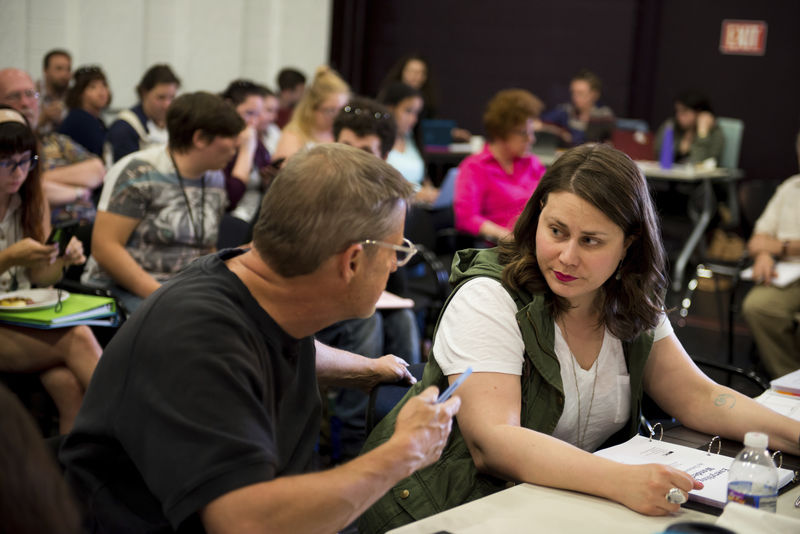A NOTE: there are multiple grammatical errors, misspellings, made-up words, and ??? moments in this interview, but I have faithfully copied it here as it appeared in its original iteration.

Director Ed Herendeen and playwright Chelsea Marcantel at the first table read of EVERYTHING IS WONDERFUL (photo credit: Seth Freeman)
by
SHEPHERDSTOWN, W.Va. — In “Everything is Wonderful,” playwright playwright Chelsea Marcantel asks the audience if they would be willing to forgive the unforgivable to find peace for both parties.
The play follows an Amish family after their two boys are killed when a car hits their buggy. In the aftermath, the family struggles to maintain their faith. As a step toward forgiveness, the family welcomes in the driver who killed the boys, which causes problems within the family and prompts the eldest daughter’s return from her excommunication.
Marcantel’s play will make its World Premiere at the Contemporary American Theater Festival on the campus of Shepherd University. The show debuts at 7:30 p.m. Friday, July 7, at the Frank Center.
Inspired from the Werner Herzog documentary “From One Second to the Next,” which chronicles the deaths of four children who are killed when the buggy they were in was hit by a driver who was texting.
“That’s where I first started really started thinking about an ideal culture that really had a lot of forgiveness for people outside, but very little tolerance for deviation within,” she said “I thought about a lot of ways to tell the story and I did a year’s worth of research and travel and interviews. And I eventually came back around to this car accident, because it’s such an insular world it would have to be this big rupture for the community to let the outsider to come in.”
There’s also an opening for resolution. If there’s a person who feels they committed a huge travesty and there’s some huge transgression if they didn’t get punished for it. And they go seeking that punishment and get forgiveness. It sounds like very fertile ground for how you deal with that then. I feel like we’re not used to seeing that radical forgiveness or accepting it.”
To research the Amish, Marcantel said she did a lot of reading as well as watching documentaries, as well as “terrible Amish realty shows.” She traveled to Lancaster, Pa., as a tourist, too, as an outsider looking into their world.
“It’s very hard especially if you don’t have business connections to get into a family’s world,” she said.
She also read first-person accounts written by people who had left the sect, but she took them with grain of salt as she knew they weren’t completed unbiased. Throughout it all, she had to find a balance from both sides of who the Amish are as individual people as well as a community as a whole.
“I feel like I’ve been through all three stages from ‘This is weird’ to ‘Oh my god, they’re really nice; they have all the answers,’ to ‘oh no this is terrible; everything is wrong is this,’ to ‘they are people living their lives and they have a right to live their life, some of it they get right, some of it they get wrong.’ They’re just like any other faith-based group. It works for a lot of people and it doesn’t work for a lot of other people.”
What Marcantel found is that Amish, in a way, are “an interesting barometer for the rest of American society because they’re going to keep doing what they’ve been doing for hundreds of years.”
“They’re not trying to be anachronistic; they just won’t change. We change and the way we view the Amish as a culture changes decade to decade,” she said. “Right now, everyone is like ‘oh it’s it beautiful and simple’ and wish we could all live so fetishly positively. During World War II they were vilified because they’re pacifists and none of them went to fight overseas. There was a lot of trying to shut down their schools and harassing them. And they’re doing exactly right now what they were doing then. It’s just that the climate in our country right now thinks that it’s very honorable and respectable, whereas in the ‘40s we felt they were very cowardly and moochers. I think it says more about how we view us, not them. They’re going to stay where they are.”
‘Wonderful’ at CATF
“Everything is Wonderful” started when Marcantel was in graduate school at Juilliard School in New York City, after earning her undergraduate at Louisiana State University. From there, the play had readings in Missoula, Mt., another reading at the New York Stage & Film; as well as one at the Atlantic Theater Co. in New York. At Shepherdstown, “Everything is Wonderful” will get its first true production.
“It’s great, because there are certain things you only learn about a play when you’re trying to fully mount a production,” Marcantel said. “I’ve had time now working with different directors, ironing out the bigger kinks of this story of how to tell this story. Now we’re fine tuning, screwing down all the nuts and bolts, getting it seaworthy so that it hangs together in a full production.”
Directing the World Premiere is Ed Herendeen, founder and producing director. Marcantel said Herendeen is a perfect fit as the play’s director.
“I think Ed has brought several qualities, which has made him the ideal director for this,” she said. “He’s just a very curious and enthusiastic human being, and in a world that’s so different from what we call mainstream society, being curious and trying to uncover the layers of the way that they function, you have to have that curiosity. And he trusts me. There are some directors, not as many modern directors, but some old-school directors who don’t want playwrights to directly interact with actors, or they don’t want actors directly asking playwrights questions, they want the actors to ask questions through them. And that can be frustrating, especially with a play I’ve been living in for over three years, to filter my responses through a director would be frustrating. Ed has totally, in the rehearsal room, has let me be part of what’s going on. He doesn’t insert himself as a barrier between me and the actor, which allows us to get things done really quickly. And also I feel like I’m very taken care of as a playwright. “
With such trust in her director, Marcantel has been able to embrace CATF has a whole during her in her first-ever time to the festival, which excites her even more because she had found out about CATF and asked her agent to get her script to Herendeen. For Marcantel, CATF is really a playwright’s dream.
“The caliber of all the artists working is just outstanding. These are the some amazing people you can find across the country, and they’re all gathered in one spot,” she said. “The thing I love about the summer colony model, it’s like a hive of activity. There’s so much going on all the time. Everybody is working at such a high level, it really becomes a space where the best work gets (done). It’s this creative soup that’s just bubbling away and being in the middle of it is very energizing. I’m actually getting some actors together just to read around the table, just to read the first script I’ve been working on while I’ve been living here. Something totally different. But there are just so many actors around, and they’re so good and they’re so enthusiastic.”
Because the town itself has such a laid-back vibe as well, Marcantel said it has allowed her to recharge.
“You get inspired and that kind of energy can carry you through the year as you go back static sort of way environment,” she said.
Growing up in a small town in Louisiana near the Gulf of Mexico, Marcantel has felt at home in Shepherdstown.
“I also really love the feeling the community really being behind the festival,” she said. “I love walking around Shepherdstown and seeing the posters everywhere and people find out you’re part of the festival and they want to talk to you about it. And board members that I have met have been so lovely. This feeling that we’re just not this little island of weirdos and the little town making something in isolation. “
She said she also loves that she’s able to work in the same spot as her husband Miles Polaski, who is sound designer and composer for her show as well as “Byhalia, Mississippi.”
“We’re both freelance theater people so we almost never get to work on the same shows at the same time,” she said. “So to get to be here together for the summer, with our dog. They found us dog-friendly housing. We all get to be together for the summer in a beautiful place.”
A passion
Eventually, Marcantel will have to return to New York for its hot, sticky summers. She has other work she still needs to finish — more plays and some TV work, with hopes of maybe venturing into documentaries.
Playwrighting, she said, gives her something different from the other types of writing she does.
“I like working collaboratively. I like working with actors and directors. I like that the fact that the own-ness is not on me to create a perfect finished product; that we’re all making something together,” she said. “I don’t have to have all the good ideas. Good ideas come all throughout the room. I just like watching people live in worlds I’ve created. On a more cerebral level that theater has a real power to promote empathy, in a way nothing else really does, to watch people that are breathing the same air as you who may be going through something very familiar or something very unfamiliar and to recognize the shared humanity with that person. And I think that’s why even in this age of all these different ways you can consume entertainment, theater continues to exist. It gives us something really special. The more I dedicate my life to it, and the longer I have to sort of why I am still doing this, the more I am convinced that it does something unique and special.”
For that, she hopes that with “Everything is Wonderful” that the audience will bel able to walk away with knowing little bit more about themselves.
“Empathy is really the currency I want to spread around. I think hope that this story will seem both strange and familiar at the same time and reinforce the idea that we’re all in this together and we’re all one big human family. Also, forgiveness is a big part of the play and not in an abstract sense but very muscular. Forgiveness is very hard and hard work, but it’s worth it. I hope that’s the leading edge what people are left with — that forgiveness is worth the effort. I don’t know if forgiveness should feel like a political statement at this point and time but maybe it is. The idea that you can look at someone who has wronged you and holding on to this anger is poisoning me, and so here’s a gift we’re giving you both. “






